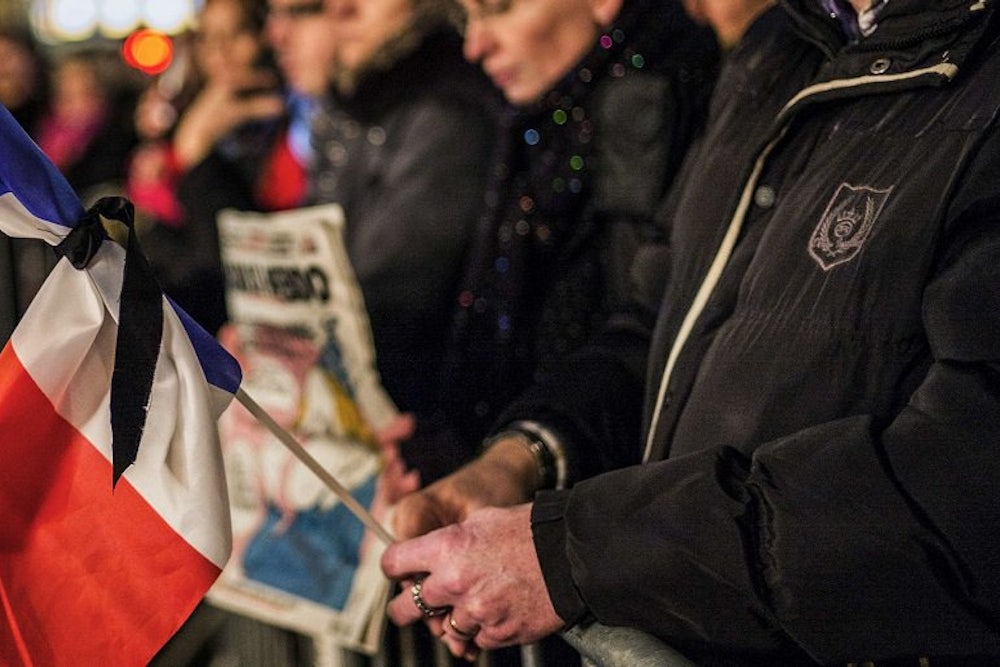Visitors to Paris—and there are plenty in this, the world’s most beautiful city (I’m biased; I’ve lived here a decade)—sometimes stumble across the neighborhood where Charlie Hebdo’s offices are located. It’s an agreeable part of town, not far from the Place de la Bastille, with a Brooklyn-y mix of workers and hipsters, traditional shops and trendy bistros. Like the rest of central Paris, it is mostly white and prosperous.
It's also vastly unlike what you might call the real Paris, the tourist-free area where 80 percent of Parisians live: that doughnut of banlieues, on the other side of the Périphérique ring road. The word banlieue ("suburb") now connotes a no-go zone of high-rise slums, drug-fueled crime, failing schools and poor, largely Muslim immigrants and their angry offspring. The banlieues erupted in 1981 and in 2005, when rioters burned hundreds of cars and President Nicolas Sarkozy threatened to clean out the area with a high-pressure hose. He did not mention that the vast majority of its residents are French citizens, speak perfect French and, unlike his father, were born in France.
It is there, and in the banlieues that blight other French cities, that attention is likely to focus once the shock of this week’s attack subsides. Early reports have pointed to two men as suspects-at-large: brothers Chérif Kouachi, 32, and Said Kouachi, 34. That they were born in Paris will spare them no scorn. The incident comes as France is tearing itself apart over questions of immigration and identity. The United States and much of Europe are having similar debates; in France, the fight is intensified by a toxic mix of politics and history, idealism and ideology.
American media have already cast this crime as a clash between religious extremism and free speech, but most Americans don't grasp how intensely these forces are felt among the French.
The Enlightenment ideas of justice and secularism on which modern France (and, not coincidentally, the United States) was founded have led the country down some curious paths. In the 19th and 20th centuries they turned France into a magnet for generations of political, religious, and artistic refugees. The resulting influx greatly enriched French culture and cuisine, at the price of creating a country where the disaffected of all sorts fight their battles. In the past half-century, France has been rocked by dozens of terrorist incidents, involving extreme rightists, extreme leftists, Algerians, Palestinians, Corsicans, Bretons and, lately, Muslim extremists.
That last group has become France’s Public Enemy No. 1. An admirable 1972 law affirming equality of all French begat a sharp increase in the number of immigrants from France’s former colonies in north Africa and the Middle East. But because of its principled obsession with secularism, the French government does not count population statistics by race or religion. Nobody really knows how many immigrants are in the country (estimates range up to 10 percent of the population) or how many of them are Muslim, let alone extremists.
The far-right National Front party, which has abandoned its traditional anti-Semitism to focus on this nebulous threat of a Muslim tide, is enjoying unprecedented popularity. Oddly, the party—and anti-immigrant sentiment generally—is strong in localities with relatively few immigrants. If elections were held today, the National Front would likely edge out President François Hollande’s ruling Socialists and give former President Sarkozy’s center-right coalition a tough race. French best-seller lists were dominated last year by TV provocateur Eric Zemmour’s Le Suicide Français, a meditation on, among other rightist nightmares, the notion that immigration is destroying French identity. Michel Houellebecq, the bad boy of French fiction whose visage graced last week’s edition of Charlie Hebdo, has followed with Submission, a novel imagining the horrors of a Muslim-dominated France.
Ludicrous as such jeremiads might seem, French security services have expressed alarm at the number of young French who have left the banlieues to fight alongside jihadists in Syria and Iraq—and the prospect that some might return home to perpetrate attacks like the one on Charlie Hebdo. Non-white French are also worried—not just at the prospect of being tarred by the Islamicist brush, but at being further discriminated against in their daily lives. Despite those founding ideals, France has arguably done a worse job than the United States, its Enlightenment-spawned twin, in integrating minorities into national life. French police conduct identity checks (a kind of stop-and-frisk indignity) disproportionately on dark-skinned citizens. Job applicants with Muslim-sounding names are far less likely to be hired—or allowed to rent in a nice neighborhood—than others with the same qualifications. Only about two percent of members of the National Assembly are non-white.
France remains a country that, more than most, conducts itself as if principles matter and, more to the point, as if France matters. Politicians, intellectuals and journalists are obsessed with France’s image abroad, as I learned when I wrote a book critical of the country’s cultural policy. France’s recent military interventions in Tunisia, Libya, Mali and the Central African Republic were motivated less by a thirst for territory or resources than by a desire to be helpful and important. It is time for France, in this difficult hour, to focus those same impulses closer to home. The blessings of liberty, equality and fraternity should no longer be lavished only on the lucky few who happen to live in the right neighborhoods. Alas, given the state of French politics and opinion—already rubbed raw by the debate over immigration—that moment will not come anytime soon.
